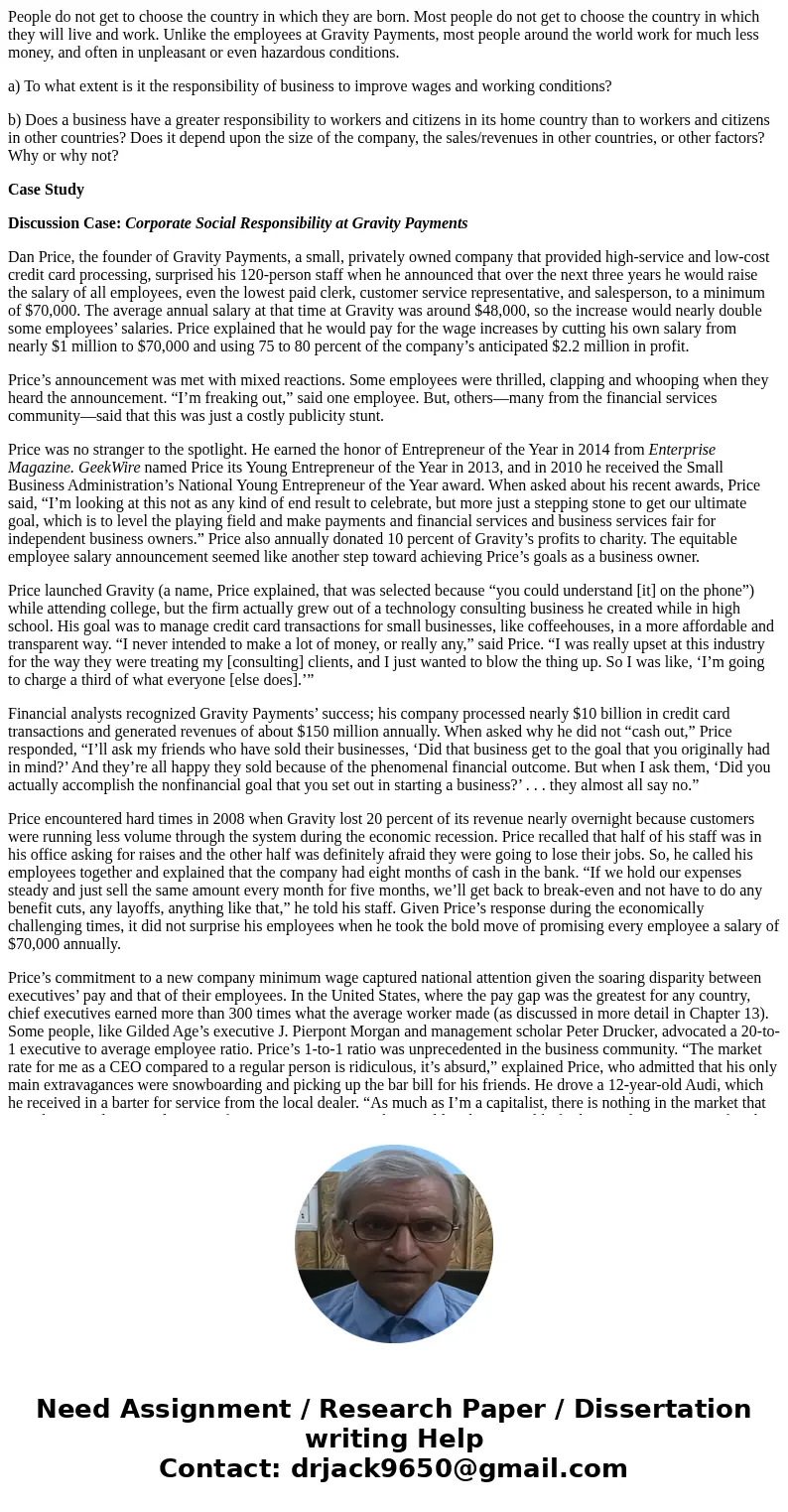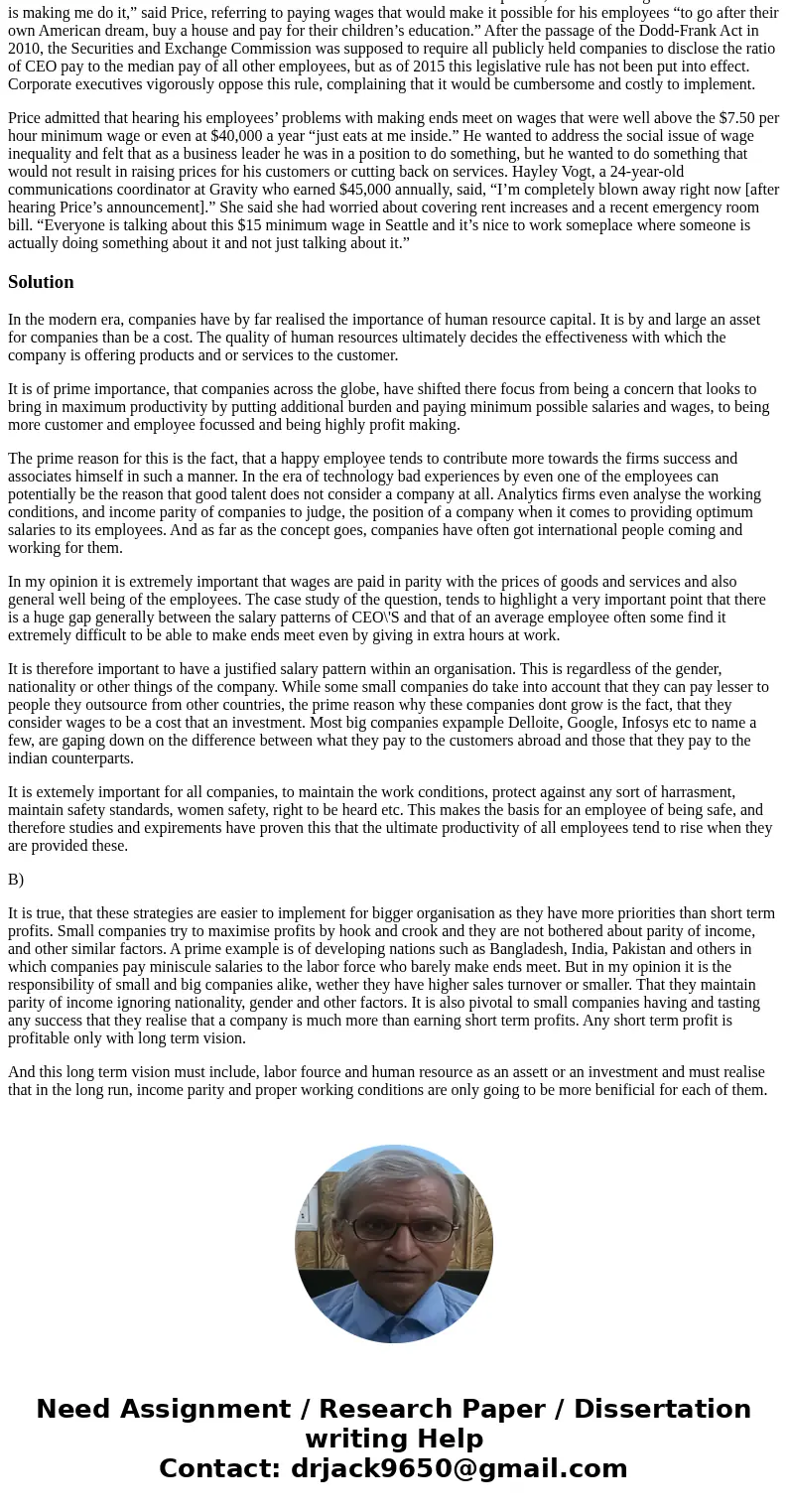People do not get to choose the country in which they are bo
People do not get to choose the country in which they are born. Most people do not get to choose the country in which they will live and work. Unlike the employees at Gravity Payments, most people around the world work for much less money, and often in unpleasant or even hazardous conditions.
a) To what extent is it the responsibility of business to improve wages and working conditions?
b) Does a business have a greater responsibility to workers and citizens in its home country than to workers and citizens in other countries? Does it depend upon the size of the company, the sales/revenues in other countries, or other factors? Why or why not?
Case Study
Discussion Case: Corporate Social Responsibility at Gravity Payments
Dan Price, the founder of Gravity Payments, a small, privately owned company that provided high-service and low-cost credit card processing, surprised his 120-person staff when he announced that over the next three years he would raise the salary of all employees, even the lowest paid clerk, customer service representative, and salesperson, to a minimum of $70,000. The average annual salary at that time at Gravity was around $48,000, so the increase would nearly double some employees’ salaries. Price explained that he would pay for the wage increases by cutting his own salary from nearly $1 million to $70,000 and using 75 to 80 percent of the company’s anticipated $2.2 million in profit.
Price’s announcement was met with mixed reactions. Some employees were thrilled, clapping and whooping when they heard the announcement. “I’m freaking out,” said one employee. But, others—many from the financial services community—said that this was just a costly publicity stunt.
Price was no stranger to the spotlight. He earned the honor of Entrepreneur of the Year in 2014 from Enterprise Magazine. GeekWire named Price its Young Entrepreneur of the Year in 2013, and in 2010 he received the Small Business Administration’s National Young Entrepreneur of the Year award. When asked about his recent awards, Price said, “I’m looking at this not as any kind of end result to celebrate, but more just a stepping stone to get our ultimate goal, which is to level the playing field and make payments and financial services and business services fair for independent business owners.” Price also annually donated 10 percent of Gravity’s profits to charity. The equitable employee salary announcement seemed like another step toward achieving Price’s goals as a business owner.
Price launched Gravity (a name, Price explained, that was selected because “you could understand [it] on the phone”) while attending college, but the firm actually grew out of a technology consulting business he created while in high school. His goal was to manage credit card transactions for small businesses, like coffeehouses, in a more affordable and transparent way. “I never intended to make a lot of money, or really any,” said Price. “I was really upset at this industry for the way they were treating my [consulting] clients, and I just wanted to blow the thing up. So I was like, ‘I’m going to charge a third of what everyone [else does].’”
Financial analysts recognized Gravity Payments’ success; his company processed nearly $10 billion in credit card transactions and generated revenues of about $150 million annually. When asked why he did not “cash out,” Price responded, “I’ll ask my friends who have sold their businesses, ‘Did that business get to the goal that you originally had in mind?’ And they’re all happy they sold because of the phenomenal financial outcome. But when I ask them, ‘Did you actually accomplish the nonfinancial goal that you set out in starting a business?’ . . . they almost all say no.”
Price encountered hard times in 2008 when Gravity lost 20 percent of its revenue nearly overnight because customers were running less volume through the system during the economic recession. Price recalled that half of his staff was in his office asking for raises and the other half was definitely afraid they were going to lose their jobs. So, he called his employees together and explained that the company had eight months of cash in the bank. “If we hold our expenses steady and just sell the same amount every month for five months, we’ll get back to break-even and not have to do any benefit cuts, any layoffs, anything like that,” he told his staff. Given Price’s response during the economically challenging times, it did not surprise his employees when he took the bold move of promising every employee a salary of $70,000 annually.
Price’s commitment to a new company minimum wage captured national attention given the soaring disparity between executives’ pay and that of their employees. In the United States, where the pay gap was the greatest for any country, chief executives earned more than 300 times what the average worker made (as discussed in more detail in Chapter 13). Some people, like Gilded Age’s executive J. Pierpont Morgan and management scholar Peter Drucker, advocated a 20-to-1 executive to average employee ratio. Price’s 1-to-1 ratio was unprecedented in the business community. “The market rate for me as a CEO compared to a regular person is ridiculous, it’s absurd,” explained Price, who admitted that his only main extravagances were snowboarding and picking up the bar bill for his friends. He drove a 12-year-old Audi, which he received in a barter for service from the local dealer. “As much as I’m a capitalist, there is nothing in the market that is making me do it,” said Price, referring to paying wages that would make it possible for his employees “to go after their own American dream, buy a house and pay for their children’s education.” After the passage of the Dodd-Frank Act in 2010, the Securities and Exchange Commission was supposed to require all publicly held companies to disclose the ratio of CEO pay to the median pay of all other employees, but as of 2015 this legislative rule has not been put into effect. Corporate executives vigorously oppose this rule, complaining that it would be cumbersome and costly to implement.
Price admitted that hearing his employees’ problems with making ends meet on wages that were well above the $7.50 per hour minimum wage or even at $40,000 a year “just eats at me inside.” He wanted to address the social issue of wage inequality and felt that as a business leader he was in a position to do something, but he wanted to do something that would not result in raising prices for his customers or cutting back on services. Hayley Vogt, a 24-year-old communications coordinator at Gravity who earned $45,000 annually, said, “I’m completely blown away right now [after hearing Price’s announcement].” She said she had worried about covering rent increases and a recent emergency room bill. “Everyone is talking about this $15 minimum wage in Seattle and it’s nice to work someplace where someone is actually doing something about it and not just talking about it.”
Solution
In the modern era, companies have by far realised the importance of human resource capital. It is by and large an asset for companies than be a cost. The quality of human resources ultimately decides the effectiveness with which the company is offering products and or services to the customer.
It is of prime importance, that companies across the globe, have shifted there focus from being a concern that looks to bring in maximum productivity by putting additional burden and paying minimum possible salaries and wages, to being more customer and employee focussed and being highly profit making.
The prime reason for this is the fact, that a happy employee tends to contribute more towards the firms success and associates himself in such a manner. In the era of technology bad experiences by even one of the employees can potentially be the reason that good talent does not consider a company at all. Analytics firms even analyse the working conditions, and income parity of companies to judge, the position of a company when it comes to providing optimum salaries to its employees. And as far as the concept goes, companies have often got international people coming and working for them.
In my opinion it is extremely important that wages are paid in parity with the prices of goods and services and also general well being of the employees. The case study of the question, tends to highlight a very important point that there is a huge gap generally between the salary patterns of CEO\'S and that of an average employee often some find it extremely difficult to be able to make ends meet even by giving in extra hours at work.
It is therefore important to have a justified salary pattern within an organisation. This is regardless of the gender, nationality or other things of the company. While some small companies do take into account that they can pay lesser to people they outsource from other countries, the prime reason why these companies dont grow is the fact, that they consider wages to be a cost that an investment. Most big companies expample Delloite, Google, Infosys etc to name a few, are gaping down on the difference between what they pay to the customers abroad and those that they pay to the indian counterparts.
It is extemely important for all companies, to maintain the work conditions, protect against any sort of harrasment, maintain safety standards, women safety, right to be heard etc. This makes the basis for an employee of being safe, and therefore studies and expirements have proven this that the ultimate productivity of all employees tend to rise when they are provided these.
B)
It is true, that these strategies are easier to implement for bigger organisation as they have more priorities than short term profits. Small companies try to maximise profits by hook and crook and they are not bothered about parity of income, and other similar factors. A prime example is of developing nations such as Bangladesh, India, Pakistan and others in which companies pay miniscule salaries to the labor force who barely make ends meet. But in my opinion it is the responsibility of small and big companies alike, wether they have higher sales turnover or smaller. That they maintain parity of income ignoring nationality, gender and other factors. It is also pivotal to small companies having and tasting any success that they realise that a company is much more than earning short term profits. Any short term profit is profitable only with long term vision.
And this long term vision must include, labor fource and human resource as an assett or an investment and must realise that in the long run, income parity and proper working conditions are only going to be more benificial for each of them.


 Homework Sourse
Homework Sourse